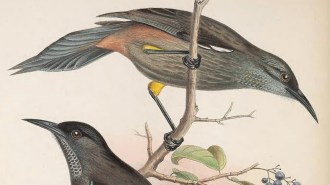Why didn’t the beetle cross the road?
A road that a person strolls across with barely a thought proves a deadly barrier for many other creatures and can disrupt the usual traffic of their genes throughout a population.
Most of the recent studies of this effect have focused on vertebrates, note Irene Keller and Carlo R. Largiadèr of the University of Bern in Switzerland. These researchers turned their attention to the ground beetle Carabus violaceus.
This insect doesn’t fly but proves to be a plucky traveler on the ground. Other researchers had observed that another species of ground beetle is extremely wary of crossing roads.
Keller and Largiadèr collected their beetles from eight places in a Swiss forest sliced by three roads. The biggest genetic differences appeared between beetles living on opposite sides of roads. Also, beetle populations confined to specific forest areas by the roads seemed to have lost some of their genetic diversity, the researchers report in an upcoming Proceedings of the Royal Society of London B. The scientists warn that expanding networks of roads could be reducing healthful genetic diversity in invertebrates.
****************
If you have a comment on this article that you would like considered for publication in Science News, please send it to editors@sciencenews.org.






